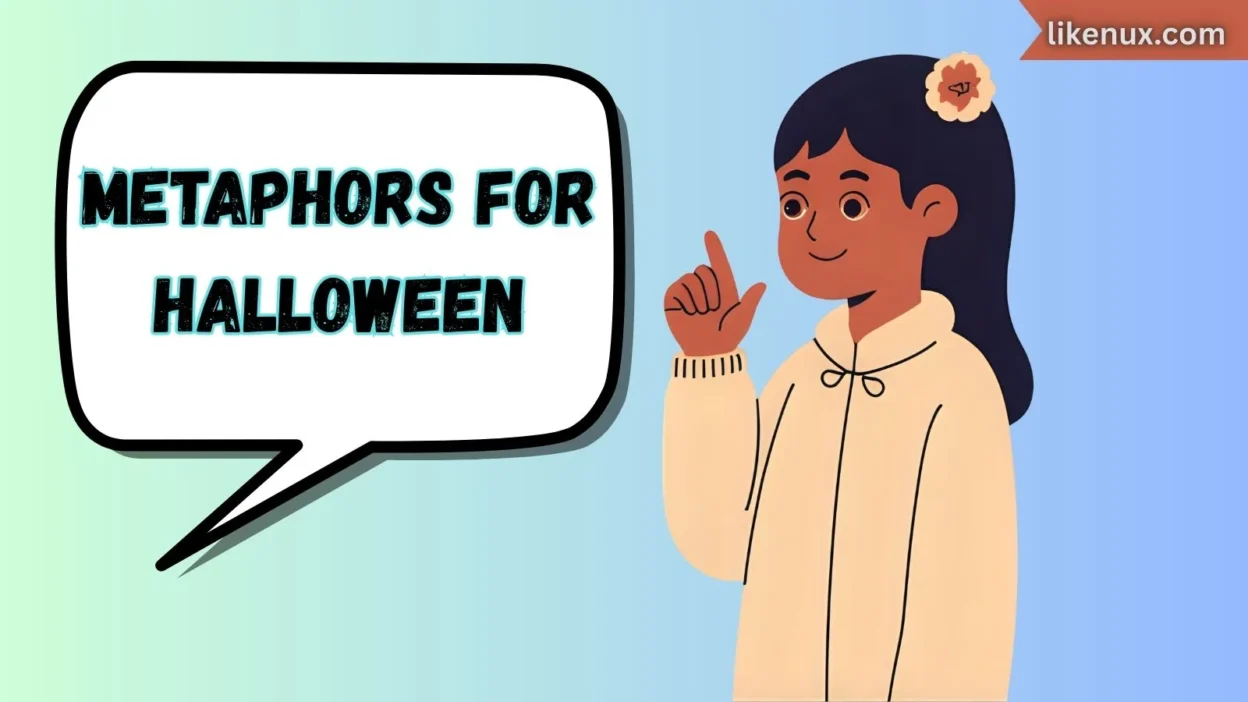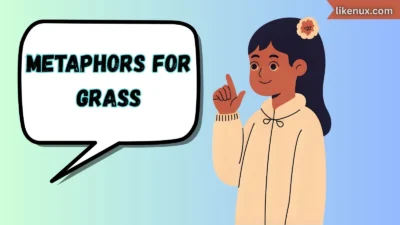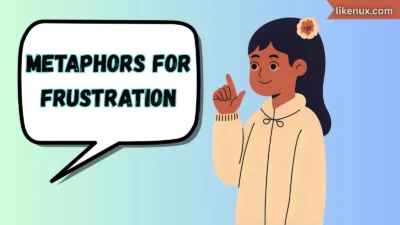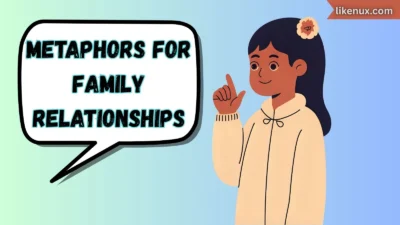Halloween has always been more than costumes and candy—it’s a season of imagination, mystery, and playful fright. For many of us, it’s a chance to revisit our childhood sense of wonder while embracing the cozy warmth of autumn nights. When words fall short, Metaphors for Halloween can bring the magic of Halloween to life.
In this article, we’ll explore 25 unique metaphors for Halloween that can help you express yourself in creative, warm, and thoughtful ways. Each metaphor comes with a simple meaning, an example sentence, its best use, and some alternative phrases you might enjoy.
1. Halloween is a midnight masquerade
Meaning: A night where everyone hides behind masks and mystery.
In a sentence: Halloween felt like a midnight masquerade where even the shyest souls stepped into the spotlight.
Best use: When describing the fun of costumes and disguise.
Other ways to say: masked ball, enchanted gathering, carnival of shadows
Read More: Metaphors for Hatred
2. Halloween is a harvest moon celebration
Meaning: A night lit by autumn’s glowing moon.
In a sentence: Under the harvest moon celebration, Halloween felt timeless and magical.
Best use: To connect Halloween with nature and seasonal beauty.
Other ways to say: moonlit gathering, autumn night glow, celestial festival
3. Halloween is a stage for the imagination
Meaning: A chance for creativity to take the spotlight.
In a sentence: For kids, Halloween is a stage for the imagination where dreams turn into costumes.
Best use: When emphasizing creativity in costumes and stories.
Other ways to say: creative showcase, canvas of wonder, fantasy platform
4. Halloween is a lantern in the dark
Meaning: A light that guides us through mystery.
In a sentence: Pumpkins carved with glowing faces turned Halloween into a lantern in the dark.
Best use: To describe jack-o’-lanterns or the comforting side of Halloween.
Other ways to say: guiding light, beacon of mystery, glowing signal
5. Halloween is a time machine to childhood
Meaning: A night that brings back childhood joy.
In a sentence: Every Halloween feels like a time machine to childhood, filled with laughter and candy.
Best use: Perfect for nostalgic conversations.
Other ways to say: nostalgia trip, doorway to the past, memory lane festival
6. Halloween is a whispering wind
Meaning: A season carried by mystery in the air.
In a sentence: The whispering wind of Halloween carried secrets through the streets.
Best use: When writing poetry or describing spooky weather.
Other ways to say: autumn breeze, eerie hush, ghostly current
7. Halloween is a playground of shadows
Meaning: A night where the dark becomes fun, not frightening.
In a sentence: Halloween transformed the neighborhood into a playground of shadows.
Best use: When describing trick-or-treating or haunted houses.
Other ways to say: shadowland, night’s playground, twilight funhouse
8. Halloween is a tapestry of traditions
Meaning: A blend of history, folklore, and culture.
In a sentence: Halloween is a tapestry of traditions woven from ancient stories and modern fun.
Best use: Great for educational or cultural explanations.
Other ways to say: cultural mosaic, festive patchwork, ritual blend
9. Halloween is a dance with the mysterious
Meaning: A celebration of the unknown.
In a sentence: On Halloween, we join a dance with the mysterious, stepping into a world of shadows.
Best use: To highlight the thrill of spookiness.
Other ways to say: mystery waltz, eerie embrace, twilight ballet
10. Halloween is a storybook come alive
Meaning: Fairy tales and ghost stories made real.
In a sentence: Halloween was a storybook come alive with witches, heroes, and ghouls walking the streets.
Best use: To describe imaginative costumes.
Other ways to say: fairy-tale night, living fable, walking folklore
11. Halloween is a pumpkin-scented memory
Meaning: A night tied to seasonal smells and feelings.
In a sentence: The pumpkin-scented memory of Halloween always feels like home.
Best use: In nostalgic or sensory writing.
Other ways to say: spiced memory, autumn aroma, seasonal recollection
12. Halloween is a costume of courage
Meaning: A time when people express boldness.
In a sentence: For shy kids, Halloween is a costume of courage that lets them shine.
Best use: Describing confidence and self-expression.
Other ways to say: mask of bravery, outfit of confidence, disguise of strength
13. Halloween is a treasure hunt in the night
Meaning: Trick-or-treating as an adventure.
In a sentence: The children’s laughter turned Halloween into a treasure hunt in the night.
Best use: For fun, playful descriptions of candy-collecting.
Other ways to say: sweet hunt, night quest, candy adventure
14. Halloween is a cauldron of creativity
Meaning: A bubbling pot of ideas and imagination.
In a sentence: From costumes to décor, Halloween is a cauldron of creativity.
Best use: When talking about crafting or decorating.
Other ways to say: brewing pot of ideas, creativity stew, bubbling imagination
15. Halloween is a mirror of myths
Meaning: A reflection of old stories and legends.
In a sentence: Halloween is a mirror of myths that still spark wonder today.
Best use: For cultural or historical context.
Other ways to say: legend’s reflection, folklore glass, myth window
16. Halloween is a theater of thrills
Meaning: A stage for spooky excitement.
In a sentence: Haunted houses make Halloween a theater of thrills.
Best use: To describe scary attractions.
Other ways to say: stage of chills, spooky performance, fright playhouse
17. Halloween is a parade of possibilities
Meaning: Endless choices of costumes and creativity.
In a sentence: Halloween is a parade of possibilities where imagination takes the lead.
Best use: Highlighting costume variety.
Other ways to say: line of choices, carnival of options, fantasy parade
18. Halloween is a puzzle of the past
Meaning: Pieces of history shaping the holiday.
In a sentence: Halloween is a puzzle of the past pieced together with new traditions.
Best use: In historical or cultural writing.
Other ways to say: history’s riddle, past mosaic, ancestral code
19. Halloween is a night’s heartbeat
Meaning: A living pulse in the autumn air.
In a sentence: The night’s heartbeat on Halloween echoed with laughter and footsteps.
Best use: To capture the energy of the holiday.
Other ways to say: night rhythm, pulse of autumn, seasonal throb
20. Halloween is a storybook lantern
Meaning: Light that tells tales.
In a sentence: The glowing pumpkins turned the street into a storybook lantern.
Best use: Describing cozy or magical scenes.
Other ways to say: fairy light, tale lamp, glowing fable
21. Halloween is a feast of the senses
Meaning: A celebration full of sights, sounds, and tastes.
In a sentence: From candy to costumes, Halloween is a feast of the senses.
Best use: Sensory or descriptive writing.
Other ways to say: autumn banquet, sensory festival, seasonal feast
22. Halloween is a bridge between worlds
Meaning: A night when reality and fantasy blur.
In a sentence: Halloween felt like a bridge between worlds—ordinary and magical.
Best use: In mystical or poetic descriptions.
Other ways to say: gateway of worlds, portal of mystery, veil between realms
23. Halloween is a spark in the darkness
Meaning: Joy found in the night.
In a sentence: Halloween is a spark in the darkness that makes the season glow.
Best use: Highlighting positivity in spooky themes.
Other ways to say: gleam of joy, light in shadows, bright flame
24. Halloween is a storybook of the streets
Meaning: Everyday places become magical.
In a sentence: The sidewalks became a storybook of the streets on Halloween night.
Best use: Describing neighborhood trick-or-treating.
Other ways to say: neighborhood tale, walking fable, magical paths
25. Halloween is a season of shared wonder
Meaning: A time for community and togetherness.
In a sentence: Halloween is a season of shared wonder where neighbors laugh together.
Best use: To capture the communal joy of the holiday.
Other ways to say: community magic, collective joy, festive bond
FAQs about Halloween Metaphors
1. Why use metaphors to describe Halloween?
Metaphors make the holiday more vivid, helping us express emotions beyond costumes and candy.
2. Can these metaphors be used in writing and speeches?
Yes! They’re perfect for creative writing, blogs, classroom activities, or even heartfelt conversations.
3. Are Halloween metaphors suitable for kids?
Absolutely. Many of these are lighthearted and fun, making them great for children’s stories.
4. How do metaphors make Halloween more meaningful?
They connect the fun of Halloween to deeper themes like imagination, courage, and community.
5. Can I adapt these metaphors for other autumn events?
Yes—many can be used for fall festivals, harvest celebrations, or even Thanksgiving.
Conclusion
Halloween isn’t just a holiday—it’s a feeling, a memory, and a shared story. Through metaphors, we capture its magic, mystery, and warmth in words that resonate deeply. Whether you’re writing, teaching, or simply reminiscing, these metaphors can help bring the spirit of Halloween alive in ways that touch both the heart and imagination.

David Robert is a passionate innovator driven by creativity, vision, and purpose. He turns bold ideas into impactful realities through focus, leadership, and dedication.



